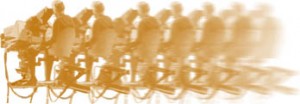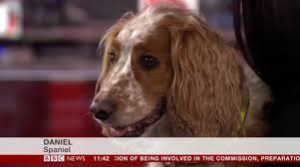In the 1950s – when many of us were young and investigating everything around us – the world was mechanical. Railway signalling was mechanical, the interlocking between points and signals being achieved by, at times, a baroque arrangement of sliding bars and pins. Cars were fully mechanical – you could buy cars with fully mechanical brakes and steering (no power assist) and mechanical spark distribution – although there was a bit of electro-mechanics in the operation of the trafficators. Telephones – well, the square waves for dialling were generated by a sort of clockwork mechanism: the Strowger electro-mechanical exchanges were based, it is reported, on a model made from a round collar box (for separate shirt collars) and some straight pins.
Sound recording involved mechanics, too: moving ribbon and moving coil microhones to capture the sound – and right up to the late 1950s it was possible to listen to gramophone records with no electronics involved at all!
So perhaps it is no surprise that some three decades earlier, when thoughts turned to broadcasting live, moving images using radio waves, mechanical systems were initially developed to capture the pictures. On 30 September 1929, Baird made the first experimental television broadcast using an electro-mechanical system.
And then, on 2 November 1936, the BBC began the world’s first regular high-definition television service: the first transmission used Baird’s 240 line flying spot mechanical system, followed by the same programme transmitted using fully electronic cameras based on cathode-ray tube technology. It was not only the start of BBC Television – it was the start of BBC Television Technical Operations (in its widest sense!)
80 years ago! When we grew up, and excitedly joined the crews in the BBC TV studios, the medium was barely 25 years old! Here you will find some more tales from the golden age of Television, told by the people who were there, but first comes our introductory page – longer than usual, as it covers a few topics that were discussed by Tech Ops people but are not part of the Tech Ops history as such.
Training versus Technology
Some Tech Ops people have been using the services of Uber, and some thought that the black cab drivers must be really, really annoyed after all that Knowledge doing and exams etc, to be superseded by someone with a smartphone and a GPS. Perhaps the Hansom cab people said similar things!
There is a certain similarity between the black cab drivers’ complaints about their having to learn the Knowledge and other skills compared to the lack of such requirements on the part of the Uber drivers and our own feelings about all the years of training and experience we all went through to get up the promotion/career ladder compared to the lack of training and experience in some present day TV and to a lesser extent Film personnel.
EU referendum
We can not avoid the elephant in the room. Bernie had an idea to set up an informal poll on the big question of the week, month, year – or even the century, during the week before the EU referendum:
(Click on the picture below to see larger version:
use your Browser’s BACK button to return to this page)

Tony Crake went to stay down in Cornwall with Joe Driver who was at TVC in the 1970s and then came to OBs in the 1980s. Joe did some ‘Referendum vox pops’ in Truro, and Tony was struck how calm and collected were some of the responses on this vexed subject.
There seemed to be some agreement that the merits of the decision were finely balanced. Generally, we particularly disliked the scare tactics used by some campaigners on either side. Really, we should try to project ten years on and work out what kind of Britain we might be in, then choose.
The chatter on the Tech Ops email before the vote itself generally contained more sensible and more cogent arguments (for either side) than the politicians had come up with.
This topic is, of course, not part of the history of BBC Tech Ops, but since we made that history, here is the results of Bernie’s poll late on the day before the Referendum itself
(Click on the picture below to see larger version:
use your Browser’s BACK button to return to this page)
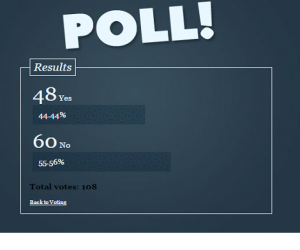
The Tech Ops poll was not far off the mark. The actual result was:
(Click on the picture below to see larger version:
use your Browser’s BACK button to return to this page)

There was a great deal of discussion about the result from supporters of both sides. Pehaps the best conclusion was forwarded by Peter Neil – something that had appeared on Social Media:
(Click on the picture below to see larger version:
use your Browser’s BACK button to return to this page)

On a sort of related issue, John Howell reckoned that the rot started when we ‘went Decimal’ and Kit Kat added a fraction to their price:
(Click on the picture below to see larger version:
use your Browser’s BACK button to return to this page)

The wrapper was found under floorboards in 1980s.
Nick Ware said that the best thing about Kit Kat was the metal foil wrapping – perfect for re-ribboning Reslo ribbon mics.(corrugated between a pair of Meccano gears). He wondered if there’s any truth in the rumour that Reslo went out of business because Nestlé switched to plastic wrappers.
But then there was an amazing week in British politics and in sport. England had been dismissed for the Euro 2016 football tournament by Iceland in the first of the knockout rounds – Iceland with a total polulation the size of Leicester (who had won the Premier League not long before, against all odds). Wales beat the number two team, Belgium, by 3 goals to 1 in the quarter finals: rydym i gyd yn Gymraeg erbyn hyn (we are all Welsh now!) – although they were gallent losers to Portugal in the semi-finals. At Wimbledon, a British player ranked 772 in the world, Marcus Willis, won his first round match to face Roger Federer – and Novak Djocovic (number 1 seed, number 1 player in the world) lost in the first week.
Confound the experts, the analysts, the bookies.
But the drama was in Politics. Jeremy Corbyn lost 60 (yes, 60) of his shadow cabinet or front bench spokespersons and faced a leadership challenge: Boris Johnson was foiled in his attempt to get on the Conservative party leadership ballot paper by Michael Gove.
Confound the experts, the analysts, the bookies.
It was the Brexit politics that was discussed by members of the Tech Ops forum. All this in the week that commemorated the 100 year anniversary of the Battle of the Somme.
Mike Jordan forwarded his picture of a London B-type bus, here overlaid on a Somme background:
(Click on the picture below to see larger version:
use your Browser’s BACK button to return to this page)
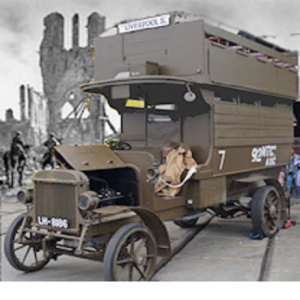
Which leads us nicely onto…
Buses
Some people have seemed to be surprised that we have so many bus, and tram, enthusiasts among us, not to mention the stream locomotive enthusiasts, traction engine enthusiasts, steam organ enthusiasts and so on… Wonderful stories of travel to school (and in the London smogs), but these are not part of Tech Ops history – except for the day that John Hays drove the “EastEnders” Routemaster (RM) from the Lot to its garage.
Martin Eccles told us that Beverley in Yorkshire had special buses with pointy roofs to fit through the “Bars” or gates in the city walls: this picture is a must!
(Click on the picture below to see larger version:
use your Browser’s BACK button to return to this page)
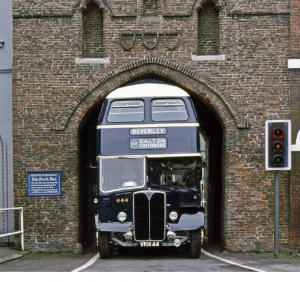
A couple of emails about Landrovers led on to stories and pictures about Patagonia, during which we learned that Graeme Wall’s in-laws live in Buenos Aires, and that Gladys Davies (a vision mixer) who used to work on the Black and White Minstrels mounted a fashion show at the Hilton in Park Lane to promote Welsh wool to the Welsh community in Patagonia. Pat Heigham recalls that she enticed several of the TV Toppers to model the clothes (they were allowed to keep them) and enticed him to provide the Minstrels music. Wout Steenhuis was the cabaret, (he used three Revox decks to achieve multitracking guitar, so he and Pat had an interesting chat, as Pat was also employing a Revox). Leslie Crowther was the MC, and very nervous, so Pat bought him a double vodka – many years later discovering that he had a drink problem. Pat wasn’t proud of that, but is still on good terms with his widow, Jean, having kept in touch.
Graeme Wall and John Nottage showed pictures of the Pieter Moreno glacier,
(Click on the picture below to see larger version:
use your Browser’s BACK button to return to this page)
 .
.
and there were pictures of the Iguacu falls on the border with Brazil.
Alastair Lawrance shared pictures of Carnaval (yes, a correct spelling!) – the appropriate one for the Tech Ops history site is this one from 2009:
(Click on the picture below to see larger version:
use your Browser’s BACK button to return to this page)
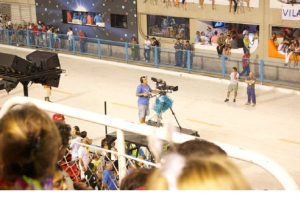
Names
Another topic which generated a lot of contributions was funny family names, some made up and some real.
Graeme Wall reminded us that his favourite was the Chinese take-away in the Mile End Road was “Foo Kin” – trumped by Geoff Fletcher who said that he and his mate Ted (the tall fellow) found this one in Amsterdam when they were there in 1984 doing some Anglia thing.
(Click on the picture below to see larger version:
use your Browser’s BACK button to return to this page)
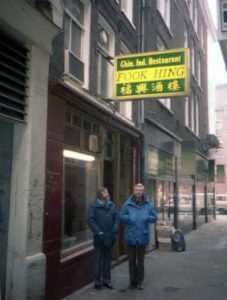
… and Steve Rogers reported that in the 1960s there was a headmaster at Clement Danes school in Ducane Road, just around the corner from TVC, called Dr Badcock – colloquially known as “Syph”.
Roger Bunce reminded us that there is no truth in the tales of smutty names in “Captain Pugwash”. It’s just one of those urban myths. The cabin boy’s name was Tom. “Mister Mate” was the only one which might be mistaken for something else. There was a court case against a comedian who claimed he had invented the rude versions. (Roger thinks it was Richard Digance.)
But there are some strange names about: the Heseltine “dog strangling” story (01 November 2016) gave rise to a Mr Daniel Spaniel pic (on the BBC News Channel):
The BBC Club at TVC
We have mentioned Eric before – Eric was the the Club Commissionaire – often tramping round the bar with his stentorian tones calling for “Mr Andrew Pandy”! Pat Heigham believed that it was Muir and Norden who used to phone the Club from their office along the corridor, and invent a call out for a fictictious name, dashing back to witness Eric doing his stuff. The sad aspect was, Pat gathered, that Eric was required to resign through age, and died but six weeks later, as that had been his life in the Club. So sad.
Geoff Fletcher wondered whether anyone recalled the cross eyed barman? Geoff always found it difficult to decide if it was him he was waiting to take an order from. Geoff remembers Pete Ware cracking up one night after the barman had asked Geoff three times what will it be and each time Geoff thought he was asking somebody else. Finally, in desperation, the poor guy poked Geoff in the chest and said, “Sure an’ its yew oim tarkin tew now!” Pete’s grin said it all. Doesn’t know his arse from his wingtip!
And then, and then … 2016 was an election year for US president. It was reportedly one of the dirtiest, vicious and divisive campaigns in US presidential election history, fought between an alleged bigoted, iconoclastic candidate with no political experience at all and an alleged devious, ambitious career politician. On the eve of the election, the polls were running neck and neck (within the sampling and statistical error): it seemed like a race to the bottom: which candidate did the electorate hate least. However, in most polls and the BBC poll of polls, Hillary Clinton was just ahead … but it was Donald Trump who won the election.
Confound the experts, the analysts, the bookies.
And now:
Here are the Tech Ops (and Tech Ops history) topics that we talked about. To help make the pages quicker to load on smart phones or tablets, all the pictures in this set of conversations (unless otherwise noted) are shown in a default size – 300 pixels wide or 300 pixels high (whichever dimension is the larger). All the pictures can be seen full size by clicking on the picture itself.
++++++++++++++++++++++++++++
3-D Photography
Pat Heigham explained how he took and showed 3-D photographs back in the day, and Bernie enthused over Google “Cardboard”.
++++++++++++++++++++++++++++
Avo Collection
Keith Wicks found a photo of a large collection of AVOs. Is there more information available about this collection?
++++++++++++++++++++++++++++
BBC Monitoring
BBC Monitoring is relocated from Caversham Park in Reading, its base since 1943.
++++++++++++++++++++++++++++
BBC Staff Surveys
Immediately after the advisory Referendum about remaining or leaving the European Union, which showed a majority in favour of Brexit, the Referendum was compared to the BBC Staff Surveys: Roger Bunce wondered what if those surveys had had the “authority” of the Referendum?
++++++++++++++++++++++++++++
Before They Were Famous
In all sorts of shows, from Practical Production Exercises through Pilots, low budget productions and to mainstream productions, we have worked with artists that were little known at the time but who subsequently hit the big time. Here are just a few stories.
++++++++++++++++++++++++++++
Blackadder Goes Forth
There are a number of Urban Myths about some of the programmes we worked on – the names of the crew in “Captain Pugwash” being one – roundly trounced by Roger Bunce.
Another myth is that the recording of the last episode of “Blackadder Goes Forth” was stopped by the crew because of an overrun. It certainly was NOT because of the crew, as our conversations convincingly prove.
Some other occasions when there has been an overrun are also discussed.
++++++++++++++++++++++++++++
Bristol – A Centre Of Excellence
Roger Bunce has been writing his memoirs for the BBCPA and felt the need to talk about John Birt’s scheme to convert all the BBC’s regions into “Centres of Excellence”. But weren’t they already Centres of Excellence – and, anyway, would London then NOT be a Centre of Excellence? Discuss.
++++++++++++++++++++++++++++
Colour Blindness
Tony Grant found lenses that help people with red/green colour blindness by selectively filtering light in a way that the company making the lenses claims corrects for red/green deficiencies. Hmmm.
++++++++++++++++++++++++++++
Comely Boom Operators
During the Radio 4 sitcom “Ed Reardonis Week”, in which the curmudgeonly author takes listeners through his week, mention was made of a comely boom operator on “Doctor Who”. News to us!
++++++++++++++++++++++++++++
Comments on Television programmes 2016
The coverage of the Olympic Games 2016 has its own section (see here).
Here are comments on some of the other programmes shown May to (start of) November 2016, including:
-
A Midsummer Night’s Dream
Trainspotting Live
The Proms 2016
Sitcom Season
Railways: the Making of a Nation
Antiques Road Show
Poldark v Victoria
Strictly Come Dancing
Television’s Opening Night: How The Box Was Born
++++++++++++++++++++++++++++
Comments on the Olympic Games coverage Rio 2016
Comments on the coverage and technical quality of the Rio Olympics 2016.
++++++++++++++++++++++++++++
Credits
Credits. In the “Golden Age” of Television no Technical Operators had a credit. As a mere camera operator, or boom operator, or sound mixer, gram op or vision control, there was no official credit on TV programmes for the contribution made by the technical crew … until Monday 27th November 1978 – after some bloody trouble-maker had a go.
But film crews got credit for the shortest insert.
This section turned into a discussion on the role and power of the various unions involved in TV production and broadcasting.
++++++++++++++++++++++++++++
Dave Mutton and Crew 14
Dave Mutton – the gentle giant of the Camera Department. He led his crew, crew 14, on some memorable TV programmes.
++++++++++++++++++++++++++++
Great Developing Shots in Cinema
Developing shots in Cinema releases, commercials – and (sorry) a Eurovision Song COntest Steadicam operator on a Segway.
++++++++++++++++++++++++++++
DIN and SCART
A conversation about the maintenance and repair of Quad amplifiers has not been reported here, but as the discussion turned to the question of plugs used in Sound and Vision, this section is shown here.
Discussion continued on to expensive cables and low-cost fuses.
++++++++++++++++++++++++++++
Early Days in TC3
Albert Barber submitted a photograph – but where, when and why was it taken?
++++++++++++++++++++++++++++
Early Handheld Colour Cameras
A brief look at some early OB radio cameras and transmitters.
And Nick Ware does a sort of “Then and now” in terms of picture capture!
++++++++++++++++++++++++++++
Following Young Dudley
This follows on from the post about Young Dudley.
The type of ped is discussed, and some of us remember our first go on a live TV camera.
++++++++++++++++++++++++++++
Hello Dolly
Identification of some less common OB dollies – and the Peregrine …
++++++++++++++++++++++++++++
Hoists and Cherry-Pickers
… Which leads nicely onto the topic of the way to get good high shots of an event: the hoists and cherry-pickers used by OBs.
++++++++++++++++++++++++++++
Hotels we have known
… and where to stay while working on OBs – and the things that happened or we did while we were there.
- The Queens Hotel, Southport
- The Royal Clarence Hotel, Exeter
++++++++++++++++++++++++++++
Interviews with Mohammed Ali
Accounts of some three or four interviews with the great showman himself.
++++++++++++++++++++++++++++
Landrovers
As Mike Jordan says, BBC OBs could never have existed without Landrovers: other people used them too, and went to wild, windy or (nearly) Welsh places.
++++++++++++++++++++++++++++
Legal Decent Honest Truthful
Reminiscences of work on Adverts – and blue screen television.
++++++++++++++++++++++++++++
Light on the Subject
The types of lamps that were used in film, OBs and TV studios – as we remember them.
++++++++++++++++++++++++++++
Lime Grove and Shepherds Bush Market
What could be more exciting when working at Lime Grove (apart form jumping up and down in the old lift to Studios D and E to make it come to a juddering halt) than roaming round Shepherds Bush Market instead of pointing a camera on “Grandstand”? Well, checking out all the restaurants and cafes round the area,.of course! Exotic food we had not seen before, like Spaghetti Bolognese to die for …
++++++++++++++++++++++++++++
Loud Singers and Loud Speakers
A short conversation which did not fit neatly into other categories. Thrown microhones, a miniature LSU 10 fold-back loudspeaker and – name dropping – Stewart Morris.
++++++++++++++++++++++++++++
More TO Course Information
More reminiscences of time spent at the BBC Engineering Training Department, Wood Norton Hall, Evesham
++++++++++++++++++++++++++++
National Radio Show – But Which One?
Your chance to do some detective work. Alec Bray found some photos taken at the National Radio Show, as was, but trying to work out WHICH National Radio Show they were taken at proved somewhat difficult.
Can you find the answer?
++++++++++++++++++++++++++++
Oh my aching back!
Portable? lightweight? hand-held cameras from the flared trouser era … and somehow this drifts into Fuller’s Earth.
++++++++++++++++++++++++++++
Operation Lymelight
John Nottage recently came across paperwork for an OB from 1971, on board the Ark Royal in Lyme Bay. This prompted memories of other OBs from ships and helicopters.
++++++++++++++++++++++++++++
People – the Crew
More personalities from the technical crews:
-
Andy Tallack
Robin Barnes
John Adcock
Rufus Cartwright
++++++++++++++++++++++++++++
Personal Mics
The pros and cons of personal mics in film and television.
++++++++++++++++++++++++++++
Personalities – the Directors
Directors with whom we have worked.
-
Stanley Dorfman
Andrew Gosling
++++++++++++++++++++++++++++
Production versus Young Generation footy match
Here is a photo showing a Production team (including TOs) in a Production versus Young Generation footy match. All the Production players have been identified.
++++++++++++++++++++++++++++
RF Interference
Walkie-talkie interference with technical equipment.
++++++++++++++++++++++++++++
Rollback and Mix
Roger Bunce wondered when it first become possible to do a “Rollback and Mix”.
The discussion covered Roll back and Mix, roll back and cut, luminance overlay and CSO as well.
Some more tales of the use of Editec also feature.
++++++++++++++++++++++++++++
School Dimmers
Lighting dimmers in use in school productions.
++++++++++++++++++++++++++++
Shakespeare Clips
This started out as an appreciation of actors in Shakesperian roles, moved swiftly into discussion about using microhones as loudspeakers and finished up with Spike Milligan and his sound effects.
++++++++++++++++++++++++++++
Sound and Vision
Our training covered operation of all the studio equipment, but at the end of our training there was the choice of maoving to the sound side of operations or towards camera work. People describe why they made one choice or the other.
++++++++++++++++++++++++++++
Sounding Off – Again
Albert Barber had some specific points to make about the problems of sound recording on recent location shoots and the comments sunsequently made by Charlotte Moore.
There was discussion about sound perception levels
++++++++++++++++++++++++++++
Spot the Errors
Two “Spot the Errors” for you!
The first one concerns an IKEA advert on TV and in the Cinema. It purports to show a couple of OBs in the late 1960s, early 1970 time period, bu there are inaccuracies and anachronisms (in some newspapers (eg “The Sunday Times”) anachronisms of recent times are known as Routemaster moments, as for example a Routemaster bus appears in a scene supposedly set before the bus was introduced.)
The second one is in a recent studio upgrade, and is a technical (operational) error of unimaginable stupidity …
++++++++++++++++++++++++++++
Start ’em young
Don’t need a media studies degree now …!
++++++++++++++++++++++++++++
Stony Faced Technicians
A press article once used the phrase “… stony faced technicians …” but how did this get started?
++++++++++++++++++++++++++++
Studio Camera Fixed Lenses
The angles of view and focal length of the lenses on the studio 4.5 inch IO cameras, the zoom indicators on some early colour zoom cameras, and the various methods of working with these tools.
++++++++++++++++++++++++++++
Take a Sapphire
Pat Heigham and Barry Bonner worked on this. Is there any more information out there about this programme?
++++++++++++++++++++++++++++
Tingles
Dave Mundy advised us that some time ago a newspaper ran an article about music and how there were some pieces that made the hairs stand up on the back of your head!
++++++++++++++++++++++++++++
What’s the Time?
Missing hands on the Elizabeth Tower clock – and no clocks on channel idents any more.
++++++++++++++++++++++++++++
Why has TV Sound got Louder
An article in the “Guardian” discussed why it seems that TV sound has got louder. Audio compression is not something new, and is very different in concept to data compression.
++++++++++++++++++++++++++++
